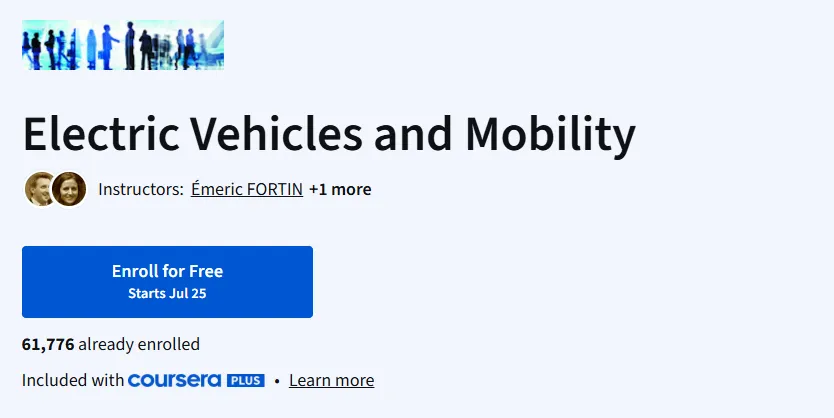What will you learn in Electric Vehicles and Mobility Course
Understand how electric vehicles (EVs) function and how they differ from internal combustion engine vehicles.
Explore the environmental, social, and economic implications of electric mobility.
Gain insights into EV charging infrastructure, battery technology, and sustainability issues.
Learn about the role of electric mobility in the future of transportation systems.
Program Overview
Module 1: Introduction to Electric Cars
⏱️ 1 week
Topics: Global EV trends, key concepts in electric mobility.
Hands-on: Overview video lessons with quizzes for foundational understanding.
Module 2: EV Technology and Performance
⏱️ 1 week
Topics: Components of electric cars, energy efficiency, drivetrain systems.
Hands-on: Compare performance data between electric and conventional vehicles.
Module 3: Energy Sources and Charging
⏱️ 1 week
Topics: Battery types, charging technologies, smart grids.
Hands-on: Analyze charging scenarios and electricity usage.
Module 4: Environmental and Economic Aspects
⏱️ 1 week
Topics: Life cycle emissions, cost of ownership, subsidies, policy incentives.
Hands-on: Case study discussions on carbon footprint and market adoption.
Module 5: Future of Electric Mobility
⏱️ 1 week
Topics: Urban mobility, autonomous EVs, integration with renewable energy.
Hands-on: Final project exploring EV deployment strategies.
Get certificate
Job Outlook
Growing demand in electric mobility, transportation planning, and sustainable energy.
EV-related roles span engineering, policy, sustainability, and product development.
Average salary range: $65,000–$120,000 per year for EV engineers and sustainability professionals.
Strong outlook in startups, automotive giants, and green energy companies.
Freelance and entrepreneurial opportunities in charging solutions and EV consulting.
Specification: Electric Vehicles and Mobility
|
FAQs
- No prior automotive or engineering experience is required.
- Basic understanding of electricity and mechanics is helpful but not mandatory.
- The course introduces EV technologies and mobility concepts step-by-step.
- Learners gradually understand battery systems, motors, and charging infrastructure.
- Beginners can develop foundational knowledge in electric vehicle systems.
- The course explains battery electric vehicles (BEVs), plug-in hybrids (PHEVs), and fuel cell vehicles (FCVs).
- Learners study electric motors, power electronics, and drivetrain configurations.
- Practical examples demonstrate differences in performance, range, and efficiency.
- Step-by-step lessons cover EV design considerations and real-world applications.
- Knowledge gained helps understand which EV technology fits various mobility needs.
- Learners explore types of chargers, charging networks, and grid integration.
- Concepts like battery management, energy storage, and regenerative braking are introduced.
- Exercises demonstrate efficiency optimization and practical deployment considerations.
- Knowledge helps evaluate energy consumption, range, and system performance.
- Skills are applicable to EV planning, engineering, and sustainable mobility projects.
- EV technology expertise is increasingly in demand across automotive and energy sectors.
- Skills improve employability for roles in EV design, engineering, and fleet management.
- Hands-on examples and case studies demonstrate practical ability to potential employers.
- Understanding energy efficiency, mobility solutions, and infrastructure planning enhances professional credibility.
- Completion shows readiness to contribute to EV-related projects and sustainable transportation initiatives.
- Estimated completion is around 4–6 weeks at a part-time pace.
- Weekly effort of 3–5 hours is generally sufficient for lectures and exercises.
- Regular engagement with examples and case studies reinforces learning.
- Revisiting exercises or exploring additional EV technologies may require extra time.
- Consistent study ensures learners develop both conceptual understanding and practical knowledge of electric vehicles and mobility.





